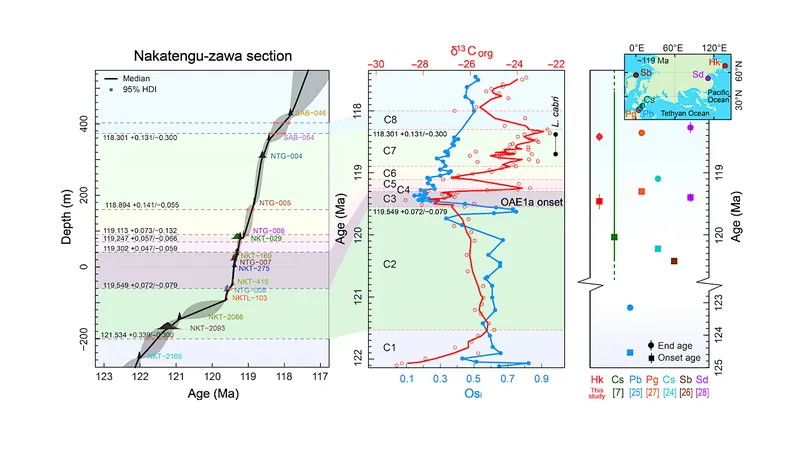
Unearthed Evidence of a Prehistoric Anoxic Ocean Event Found in Japan - Are We Heading for a Similar Catastrophe?
2024-12-19
Author: Rajesh
Unearthed Evidence of a Prehistoric Anoxic Ocean Event Found in Japan - Are We Heading for a Similar Catastrophe?
Recent studies of ancient rocks and fossils emerging from Mount Ashibetsu in Japan have unlocked critical insights into Ocean Anoxic Event 1a (OAE 1a), a catastrophic environmental disruption that dramatically depleted oxygen in our oceans and led to significant extinction events, particularly among plankton. This research, spearheaded by a team from Northwestern University, highlights the effects of volcanic activity on marine ecosystems and raises alarm about the potential parallels to modern climate change.
For decades, scientists have theorized that massive undersea volcanic eruptions during the Mesozoic Period led to increases in carbon dioxide (CO2) levels and global warming, which in turn caused anoxia in the oceans. The newly published study pinpoints that OAE 1a began 119.5 million years ago and persisted for over 1.1 million years. This crucial data allows researchers to better comprehend the Earth's climatic mechanisms and to draw comparisons with today's human-induced warming trends.
"This discovery is a crucial piece of the puzzle in understanding how our planet's climate responds to stressors," stated Brad Sageman, a senior author of the study. "To accurately predict future climate scenarios due to human activities, we must look back and examine these past events."
The study underscores that during the Cretaceous Period, unprecedented volcanic eruptions led to an overwhelming injection of carbon dioxide into the ocean and atmosphere. These eruptions originated from extensive igneous provinces, producing colossal amounts of basalt over several million years, resulting in the formation of weak carbonic acid when CO2 interacted with seawater. The ramifications were dire—acidification coupled with depleted oxygen levels caused massive extinctions in ocean life.
Initially raised from obscurity in the mid-1970s by geologists Seymour Schlanger and Hugh Jenkyns, the concept of ocean anoxic events gained traction as intriguing patterns in sediment samples suggested a global phenomenon. These black, organic carbon-rich shales indicated widespread lack of oxygen, which inhibited the decomposition of organic matter and led to the formation of distinct carbon-rich geological layers around the world.
The new study drew connections between these ancient events and present-day realities. As ocean health continues to decline, researchers have found low-oxygen zones in parts of the Gulf of Mexico today—mirroring ancient conditions that contributed to massive extinctions. "The primary concern is that while past anoxic events took tens of thousands to millions of years to unfold, the rapid pace of modern climate change could lead to a similar, or worse, scenario in a fraction of that time," Sageman warned.
The research team utilized advanced isotope analysis to trace the geological timeline of these events. By studying volcanic tuffs formed from ash, they could precisely date eruptions that correspond with significant shifts in atmospheric CO2 levels. The findings reveal that the onset of OAE 1a coincided with eruptions from the Ontong Java Nui complex, one of the largest igneous provinces in the world.
As scientists draw parallels between historical climate events and current environmental challenges, the urgency to address human-induced climate change intensifies. By comprehensively studying past anoxic events, researchers believe we can glean insights into the potential long-term impacts of our current trajectory—information that could prove invaluable in averting future ecological disasters.



 Brasil (PT)
Brasil (PT)
 Canada (EN)
Canada (EN)
 Chile (ES)
Chile (ES)
 España (ES)
España (ES)
 France (FR)
France (FR)
 Hong Kong (EN)
Hong Kong (EN)
 Italia (IT)
Italia (IT)
 日本 (JA)
日本 (JA)
 Magyarország (HU)
Magyarország (HU)
 Norge (NO)
Norge (NO)
 Polska (PL)
Polska (PL)
 Schweiz (DE)
Schweiz (DE)
 Singapore (EN)
Singapore (EN)
 Sverige (SV)
Sverige (SV)
 Suomi (FI)
Suomi (FI)
 Türkiye (TR)
Türkiye (TR)